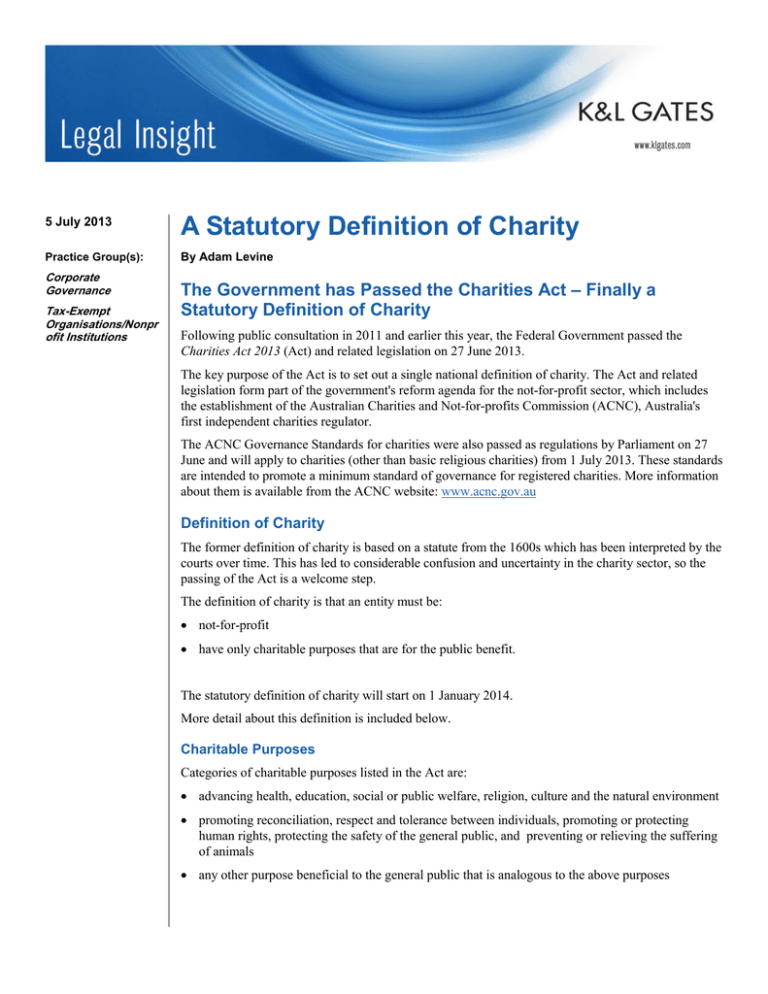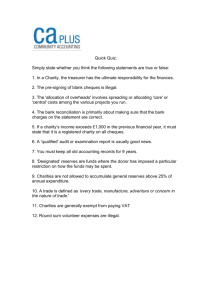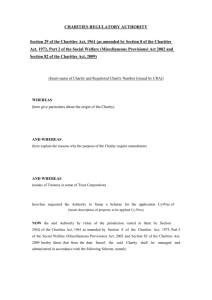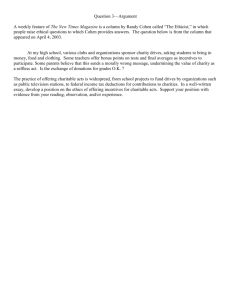
5 July 2013
A Statutory Definition of Charity
Practice Group(s):
By Adam Levine
Corporate
Governance
Tax-Exempt
Organisations/Nonpr
ofit Institutions
The Government has Passed the Charities Act – Finally a
Statutory Definition of Charity
Following public consultation in 2011 and earlier this year, the Federal Government passed the
Charities Act 2013 (Act) and related legislation on 27 June 2013.
The key purpose of the Act is to set out a single national definition of charity. The Act and related
legislation form part of the government's reform agenda for the not-for-profit sector, which includes
the establishment of the Australian Charities and Not-for-profits Commission (ACNC), Australia's
first independent charities regulator.
The ACNC Governance Standards for charities were also passed as regulations by Parliament on 27
June and will apply to charities (other than basic religious charities) from 1 July 2013. These standards
are intended to promote a minimum standard of governance for registered charities. More information
about them is available from the ACNC website: www.acnc.gov.au
Definition of Charity
The former definition of charity is based on a statute from the 1600s which has been interpreted by the
courts over time. This has led to considerable confusion and uncertainty in the charity sector, so the
passing of the Act is a welcome step.
The definition of charity is that an entity must be:
not-for-profit
have only charitable purposes that are for the public benefit.
The statutory definition of charity will start on 1 January 2014.
More detail about this definition is included below.
Charitable Purposes
Categories of charitable purposes listed in the Act are:
advancing health, education, social or public welfare, religion, culture and the natural environment
promoting reconciliation, respect and tolerance between individuals, promoting or protecting
human rights, protecting the safety of the general public, and preventing or relieving the suffering
of animals
any other purpose beneficial to the general public that is analogous to the above purposes
A Statutory Definition of Charity
promoting a change to any matter established by law, policy or practice where the change will aid
one of the above purposes, or opposing such a change where the change will oppose or hinder one
of the above purposes.
An entity may have incidental or ancillary purposes that aid the charitable purpose, but it must not
have an independent, non-charitable purpose.
The list of charitable purposes in the Act does not exclude charitable purposes identified by courts
prior to the commencement of the statutory definition. However, once the Act becomes law, the courts
will not be able to create new charitable purposes; only charitable purposes listed in the Act will
qualify.
If an entity has either of the following purposes, it is disqualified from meeting the definition of
charity:
engaging in or promoting activities that are unlawful or contrary to public policy
promoting or opposing a political party or a political candidate. This does not apply to advancing
debate about or critiquing the policies of political parties or candidates.
Public Benefit
According to the Act, an entity's purposes will be of 'public benefit' if:
achieving those purposes would be of public benefit (taking into account any possible detriment to
the general public) and
the benefit (tangible or intangible) is available to the general public, or a sufficient section of the
general public.
This definition of public benefit is consistent with common law principles.
Certain purposes are presumed to be of public benefit, including relieving sickness and human
suffering, advancing education or religion, relieving poverty, and supporting the aged and individuals
with disabilities.
Entities that hold or manage benefits that relate to either native title or indigenous land rights, for the
benefit of indigenous individuals, will be considered as having a purpose for the public benefit.
Next Steps
For existing charities, nothing will change when the statutory definition of charity starts on 1 January
2014.
ACNC will develop a statement outlining its approach to the definition of charity, charitable purposes
and the different types of charities. The statement will be released for comment prior to being
finalised.
Charities (other than basic religious charities) are expected to comply with the ACNC Governance
Standards from 1 July this year. The ACNC is developing guidance about complying with the
Governance Standards, and recommends that charities wait for this guidance before taking action.
This will prevent any unnecessary time or expense being incurred while undertaking compliance
activities. The ACNC has indicated that for the first two years after 1 July, its compliance focus will
be directed towards serious breaches of Governance Standards (such as gross financial negligence),
and it expects most well-run charities will be largely compliant with the Governance Standards.
2
A Statutory Definition of Charity
Further information is available at www.acnc.gov.au or please contact K&L Gates if your charity
requires assistance.
Authors:
Adam Levine
adam.levine@klgates.com
+61.8.9216.0965
Anchorage Austin Beijing Berlin Boston Brisbane Brussels Charleston Charlotte Chicago Dallas Doha Dubai Fort Worth Frankfurt
Harrisburg Hong Kong Houston London Los Angeles Melbourne Miami Milan Moscow Newark New York Orange County Palo Alto Paris
Perth Pittsburgh Portland Raleigh Research Triangle Park San Diego San Francisco São Paulo Seattle Seoul Shanghai Singapore Spokane
Sydney Taipei Tokyo Warsaw Washington, D.C. Wilmington
K&L Gates practices out of 48 fully integrated offices located in the United States, Asia, Australia, Europe, the
Middle East and South America and represents leading global corporations, growth and middle-market companies,
capital markets participants and entrepreneurs in every major industry group as well as public sector entities,
educational institutions, philanthropic organizations and individuals. For more information about K&L Gates or its
locations, practices and registrations, visit www.klgates.com.
This publication is for informational purposes and does not contain or convey legal advice. The information herein should not be used or relied upon in
regard to any particular facts or circumstances without first consulting a lawyer.
©2013 K&L Gates LLP. All Rights Reserved.
3
A Statutory Definition of Charity
4







